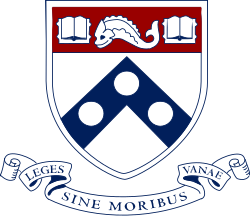 University of Pennsylvania Law School | |
| Discipline | Business law |
|---|---|
| Language | English |
| Edited by | Nicolle Stracar |
| Publication details | |
Former name(s) | University of Pennsylvania Journal of Labor and Employment Law; University of Pennsylvania Journal of Business and Employment Law |
| History | 1997-present |
| Publisher | University of Pennsylvania Law School (United States) |
| Frequency | Quarterly |
| Standard abbreviations | |
| Bluebook | U. Pa. J. Bus. L. |
| ISO 4 | Univ. Pa. J. Bus. Law |
| Indexing | |
| ISSN | 1945-2934 |
| Links | |
The University of Pennsylvania Journal of Business Law is a scholarly journal focusing on issues of business law, corporate governance, securities regulation, capital markets regulation, the law of mergers and acquisitions, and employment law. The Journal is published four times annually by an organization of second and third year law students at the University of Pennsylvania Law School. The journal is one of six major scholarly journals at the University of Pennsylvania Law School and one of the top five most cited business law journals in the United States. [1]